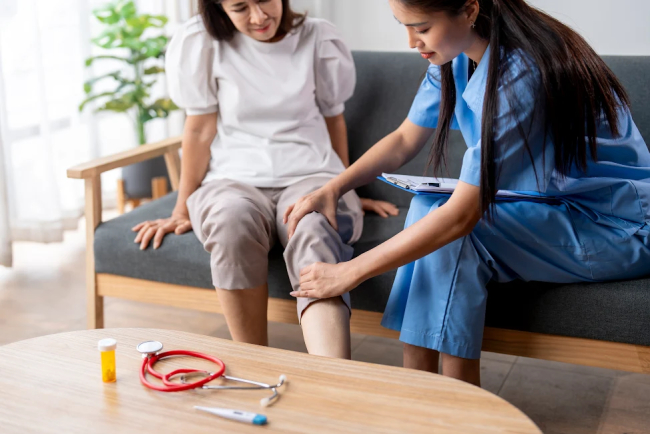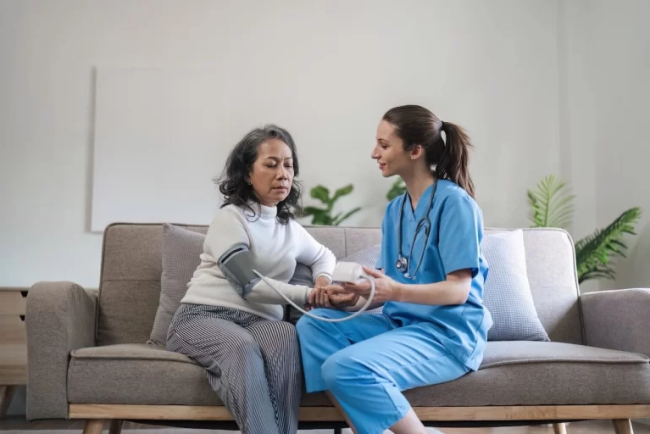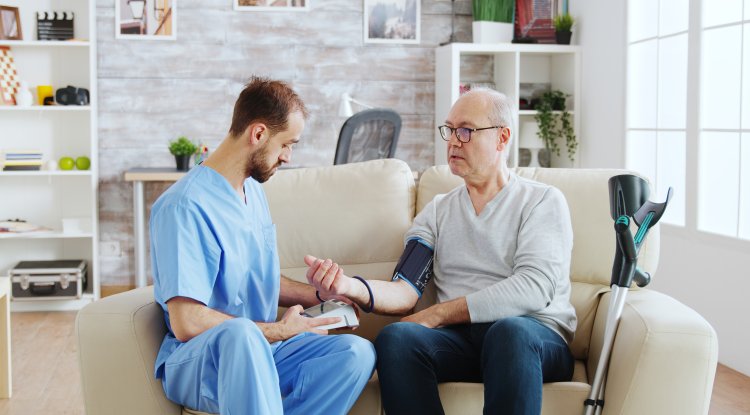After Stroke Recovery: A Step-by-Step Guide: Getting Stronger at Home
Learn the key benefits of hiring a male nurse for home care, including physical assistance, professional medical support, and reliable patient care.

Having a stroke changes life in an instant. The hospital helps get things stable, but the real journey of getting better starts after you come home. This path is different for everyone. It takes time, patience, and the right kind of help. Knowing what to expect during stroke recovery at home is key to making the best progress. This guide breaks down the steps and shows how professional home nursing services can be your essential partner every step of the way.
Step 1: Settling Back Home & Staying Safe (First Few Weeks Home)
-
Coming Home: Leaving the hospital can feel both wonderful and scary. Home is familiar, but it also has new challenges. Keeping your loved one safe is the most important thing right now.
-
What Needs Attention:
-
Medicine Routine: Taking medicines correctly (like blood thinners or blood pressure pills) is vital to prevent another stroke. A home nurse makes sure the right medicines are taken at the right times, watches for any problems, and teaches the family.
-
Caring for Wounds (if needed): If there are cuts or sores from the hospital, they need clean care to avoid infection. This is a key job for skilled nursing at home.
-
Checking Basics: Regularly checking blood pressure, heart rate, and sometimes blood sugar is important. A home health nurse does this accurately and tells the doctor if anything seems off.
-
Rest is Key: Feeling very tired is normal. Your loved one needs lots of rest mixed with very short, simple activities. Trying to do too much too soon can set recovery back.
-
How Home Nursing Helps: They watch over medical needs, make sure the home is safe, teach families the basics of care, look out for early signs of trouble (like infection), and keep the doctor updated.
Step 2: Getting Active & Relearning Skills (Next Few Months)
This is often when you see the most improvement, thanks to regular rehabilitation at home or therapy visits, plus practice at home.
-
What Needs Attention:
-
Moving Better (Physical Therapy - PT): Building back strength, balance, and the ability to move. This includes practicing walking, getting in and out of bed or chairs, and learning to use an arm or leg that was affected. Home nurses can help practice PT exercises safely, watch for tiredness or pain, and make sure things are done correctly.
-
Daily Living Skills (Occupational Therapy - OT): Relearning how to do everyday things – like dressing, bathing, eating, and simple cooking. OT helps find easier ways to do these tasks, sometimes using special tools. Home nurses encourage practicing these skills during the day and help make the bathroom and kitchen safer.
-
Talking, Thinking & Swallowing (Speech Therapy - SLP): Helping with trouble speaking or understanding words, problems swallowing safely (which can be serious), and issues with memory or concentration. Home nursing is crucial for watching closely during meals to prevent choking (following the SLP's plan), helping with communication, and noticing changes in thinking.
-
Managing Stiff Muscles: Muscles might get very tight. This needs special stretches, maybe medicine, and working closely with therapy and nursing.
-
How Home Nursing Helps: They act as the link between therapy visits. They make sure exercises are done safely and correctly, watch carefully during eating and drinking, help with things like catheters if needed, track progress, and talk to all the doctors and therapists involved.
Step 3: Keeping Progress & Living Well (Long-Term - Months and Years Ahead)
Getting better can continue for a long time, shifting towards living as independently as possible and adjusting to any lasting effects.
-
What Needs Attention:
-
Ongoing Therapy: Progress might slow down, but continuing some PT, OT, or speech therapy helps keep improving skills, build stamina, and tackle harder tasks. Visits usually become less frequent.
-
Stopping New Problems: Staying watchful for things like blood clots, lung infections (especially if swallowing is hard), falls, bed sores, and feeling sad or worried remains super important. Regular home nurse check-ups help catch problems early.
-
Mind & Feelings: Helping with any leftover thinking or memory issues, watching for depression or anxiety (very common after stroke), and supporting everyone's emotional well-being.
-
Getting Back to Life: Slowly returning to seeing friends, hobbies (maybe changed a bit), and finding new ways to enjoy life.
-
Making Home Safer: Adding things like grab bars in the bathroom, ramps, or stairlifts if needed for safety and ease.
-
How Home Nursing Helps: They provide regular check-ins to watch for health changes or new problems. They manage long-term medicines and other health conditions. They offer important support for sticking to medicine routines. They provide friendly company, watch for mood changes, and help with tricky daily tasks if needed, giving family caregivers a break.
Why Home Nursing Services Are So Important for Recovery
Stroke recovery at home isn't just about exercises. It involves careful medical care mixed into everyday life. That's where home nursing services become truly essential:
-
Medical Experts at Home: Nurses handle complex medicines, wound care, vital sign checks, and spot small changes that families might miss. This helps prevent trips back to the hospital.
-
Safety First: Nurses constantly check the home for dangers, help prevent falls, and make sure moving around is safe – a big worry after a stroke.
-
Safe Eating & Drinking: Helping someone eat and drink safely after a stroke is critical to avoid serious lung infections. Home nurses are specially trained for this.
-
Helping Therapy Work Better: They make sure exercises and techniques learned in therapy are used correctly every day at home, getting the most out of each session.
-
Support for Family Caregivers: Family members doing the caregiving work incredibly hard and can get overwhelmed. Home nurses teach, train, and give families much-needed breaks to avoid burnout.
-
Team Communication: They talk to doctors, therapists, and others, making sure everyone is on the same page about the care plan.
-
Caring Support: Nurses offer kindness, listen to worries, and help make sure the stroke survivor's voice is heard in their healthcare.
Your Recovery Journey, Our Helping Hand
Recovering from a stroke is a long road. It needs strength, the right care, and good support. Knowing these steps after a stroke helps you plan for what comes next. While family love is everything, the medical parts of recovery often need professional skills.
Our home nursing team is here to be your partner through every stage – from those first careful days at home, through the busy months of getting stronger, and into the long-term journey of living well. We bring the medical care, the safety watch, the therapy help, and the caring support needed for the best possible recovery in the comfort of home. Let us help you focus on rebuilding strength, independence, and hope, one day at a time.
Want to know how our home nursing in Bangalore support can help your stroke recovery journey? Get in touch today for a friendly chat. We're here to help you move forward with confidence and expert care right where you live.
What's Your Reaction?
















